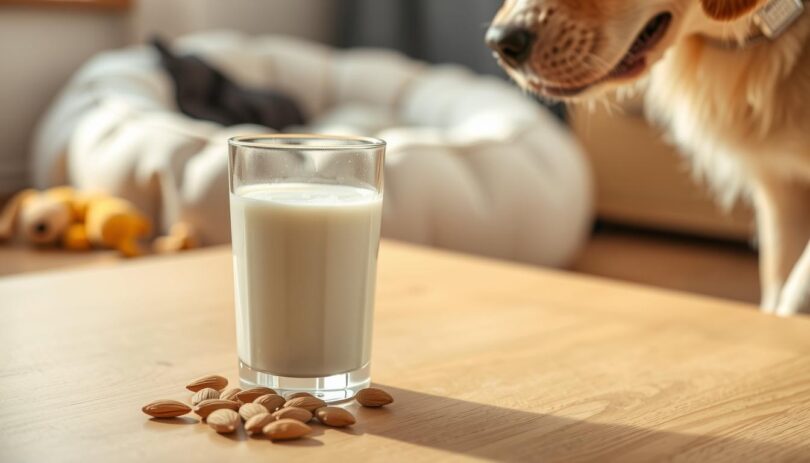Pet owners often wonder about sharing their favorite treats with furry companions. Those morning lattes or smoothies might spark curiosity—could a sip of almond-based beverages be safe? Understanding what’s best for a four-legged friend requires balancing enthusiasm with caution.
While plant-based alternatives like almond milk may seem harmless, not all human foods suit canine digestion. Moderation matters, as even small quantities could lead to stomach upset in sensitive pets. However, when introduced carefully, some nut-derived products offer nutritional perks.
This guide explores how lactose intolerance affects many adult animals, making traditional dairy problematic. Plant-based options provide potential workarounds but require vet-approved strategies. Vitamins and antioxidants in fortified almond milk might support skin health or immunity—if chosen wisely.
Safety hinges on avoiding additives like xylitol or excess sugar. Unsweetened, plain varieties are preferable, served occasionally as treats rather than dietary staples. Every pet reacts differently, so observing behavior after consumption remains critical.
By separating myths from facts, this article clarifies when and how to consider almond milk for dogs. Let’s navigate the pros, cons, and smarter choices together—ensuring tails keep wagging safely.
Understanding Can Dogs Have Almond Milk: Overview & Key Considerations
Exploring dietary alternatives for pets involves more than swapping ingredients. Plant-based beverages like almond-derived options often spark debates among animal nutrition experts. Let’s clarify their role in a balanced approach to pet care.
Nutritional Profiles: Animal vs. Plant Sources
Traditional dairy contains lactose and higher protein levels, while almond-based products lack these naturally. The latter is made by blending soaked nuts with water and straining the mixture. This process creates a thinner liquid with fewer calories but also reduced calcium unless fortified.
Unlike cow’s milk, these alternatives typically have less saturated fat. However, they may include added sugars or synthetic vitamins to mimic dairy’s benefits. Always check labels for xylitol—a toxic sweetener for animals.
Separating Fiction from Reality
Myth: All plant-based drinks are safer than dairy for pets. Fact: Many contain additives that disrupt digestion. Another misconception claims these products boost hydration significantly. In reality, water remains the optimal choice for daily fluid intake.
Some brands market their items as complete dietary solutions. Veterinarians stress these should never replace balanced meals tailored to carnivorous needs. Occasional small servings of unsweetened varieties might suit lactose-sensitive pets, but moderation is non-negotiable.
Nutritional Benefits and Health Implications for Your Dog
When evaluating dietary additions for pets, understanding nutritional value becomes essential. Plant-based milk products offer specific advantages when chosen thoughtfully and served in moderation.
Essential Nutrients and Vitamins in Almond Milk
Fortified almond milk often contains vitamin E, calcium, and antioxidants. These elements support immune function and bone health. Unlike cow milk, it’s naturally lactose-free and lower in saturated fats.
Antioxidants combat oxidative stress, while vitamin A promotes vision. However, unsweetened varieties are crucial—added sugars or artificial sweeteners negate benefits. Always verify labels for harmful additives like xylitol.
How Almond Milk Supports Skin and Coat Health
Vitamin E in almond-based products helps maintain healthy skin barriers. This nutrient reduces dryness and irritation, fostering a glossy coat. Studies show antioxidants also minimize inflammation linked to allergies.
Compared to traditional dairy, plant-based options provide fewer calories but similar hydration perks. For pets with sensitive stomachs, small servings may complement a balanced diet without triggering digestive issues.
Assessing the Risks and Digestive Considerations
What happens when pets consume unfamiliar foods? Even seemingly harmless items may trigger unexpected reactions. Observing how a four-legged companion processes new additions remains vital for proactive care.
Gastrointestinal Reactions and Pancreatitis Risk
High-fat content in certain nut-based beverages poses a hidden threat. Excessive amounts could strain the pancreas, leading to inflammation—a condition requiring urgent veterinary attention. Symptoms like vomiting or lethargy signal immediate concern.
Lactose-intolerant animals might tolerate plant-based options better than dairy. However, additives like thickeners or sweeteners often disrupt digestion. Watery stools or abdominal discomfort after consumption suggest intolerance. Owners should track these signs closely.
Understanding Allergic Reactions and Sensitivities
Allergies to tree nuts—though rare—can manifest as itching, swelling, or hives. Introduce small portions initially to test tolerance. Persistent scratching or facial puffiness warrants discontinued use.
Even unsweetened varieties carry risks if served excessively. Moderation prevents overload on sensitive systems. Those noticing irregular bowel movements should review why diarrhea occurs and consult professionals promptly.
Balanced diets prioritize species-appropriate nutrition. Occasional treats shouldn’t replace meals tailored to carnivorous needs. When managed thoughtfully, plant-derived beverages may complement—not compromise—well-being.
Comparing Plant-Based Milk Alternatives for Dogs
Selecting the right plant-based beverage for pets requires careful evaluation of nutritional profiles and safety factors. While almond-based options often spark curiosity, soy, oat, and coconut varieties each present unique benefits and challenges.
Nutritional Differences Between Popular Options
Soy milk offers higher protein content but may trigger allergies in sensitive pets. Oat varieties provide soluble fiber for digestion but often contain added sugar. Coconut products deliver healthy fats yet pose pancreatitis risks due to saturated fat levels.
Almond-derived beverages rank lower in calories but lack natural nutrients unless fortified. Always prioritize unsweetened versions to avoid unnecessary additives. Homemade recipes allow complete control over ingredients—ideal for cautious introductions.
Hidden Hazards in Commercial Products
Xylitol remains a critical concern, as this sweetener proves toxic even in small amounts. Carrageenan, a common thickener, may cause intestinal inflammation. Check labels for artificial flavors or excessive salt that could harm renal health.
When considering alternatives, focus on simplicity. Single-ingredient options minimize digestive surprises. Consult your veterinarian about fat content and serving sizes tailored to your companion’s needs. Occasional treats should complement—not replace—their primary diet.
Safe Introduction: How to Add Almond Milk to Your Dog’s Diet
Introducing new items to a pet’s menu requires strategy and patience. Start with tiny portions to gauge tolerance, mixing a teaspoon into regular meals. Observe for 24 hours before increasing quantities.
Guidelines for Moderation and Proper Serving Sizes
Smaller breeds should receive no more than a tablespoon weekly, while larger ones can handle up to three. Treats shouldn’t exceed 10% of daily food intake. Overfeeding may cause digestive distress despite good intentions.
Consult your vet about existing health conditions affecting serving sizes. Pets with kidney issues or obesity often need stricter limits. Always choose unsweetened varieties to avoid harmful additives.
DIY Almond Milk: A Step-by-Step Recipe for Pet Owners
Blend one cup soaked almonds with four cups water for two minutes. Strain through cheesecloth, discarding pulp. Store the liquid in glass containers for up to four days.
Skip sweeteners, salt, or flavorings. Homemade versions eliminate preservatives found in store-bought options. Serve chilled—room-temperature portions blend better with kibble.
Watch for changes in energy levels or coat texture after introducing this supplement. Discontinue use if vomiting or itching occurs, and contact your vet immediately.
Environmental Impact and Ingredient Sourcing in Almond Milk Products
Sustainability plays a growing role in pet nutrition decisions. Plant-based beverages like almond milk carry hidden ecological footprints that conscientious owners should consider. Balancing animal wellness with planetary health requires informed choices.
Eco-Friendly Considerations in Almond Production
Almond cultivation demands significant water resources—over a gallon per nut. Drought-prone regions like California face strain as 80% of global almonds grow there. Conventional farming often uses synthetic pesticides, harming pollinators like bees critical to ecosystems.
Irrigation practices vary widely. Some farms implement micro-sprinklers to reduce waste, while others rely on flood methods. Choosing brands committed to water-efficient techniques helps mitigate environmental stress.
Choosing Organic and Additive-Free Options
Many commercial products contain thickeners like carrageenan or preservatives linked to health risks. Organic almond milk avoids synthetic additives and pesticides, supporting cleaner farming practices. Brands like MALK Organics and Elmhurst use minimal ingredients and sustainable packaging.
Prioritizing additive-free options reduces chemical runoff into waterways. This protects aquatic habitats while providing safer treats for pets. Always verify certifications like USDA Organic or Non-GMO Project Verified.
Eco-conscious sourcing benefits both four-legged companions and ecosystems. Small shifts—like selecting responsibly made almond milk—contribute to broader environmental solutions without compromising pet safety.
Final Reflections on Can Dogs Have Almond Milk for a Balanced Diet
Navigating pet nutrition requires balancing curiosity with caution. Plant-based beverages like almond-derived options offer occasional benefits but demand careful selection. Unsweetened varieties provide vitamins and hydration without lactose—ideal for sensitive stomachs compared to cow’s milk.
These products shouldn’t replace meals, as they lack essential proteins found in animal sources. While fortified almond milk can be a good supplement, excessive servings risk digestive upset. Cow’s milk often triggers lactose intolerance, making nut-based alternatives a safer occasional treat.
Prioritize additive-free options and consult veterinarians before dietary changes. Observe pets for reactions like itching or stomach discomfort. Remember: even milk good for humans might not align with carnivorous needs.
Ultimately, moderation and vet guidance ensure safer experimentation. By choosing wisely and respecting portion limits, owners can explore cow milk alternatives without compromising health. Informed decisions empower caregivers to blend innovation with tradition—keeping tails wagging nutritiously.
FAQ
Is plant-based milk a safe alternative for lactose-intolerant pets?
Unsweetened almond milk may be suitable in small quantities for pets with lactose intolerance. However, many brands contain additives like xylitol or excess sugar, which pose health risks. Always consult a vet before introducing new products.
How does almond milk nutrition compare to traditional dairy for pets?
While lacking cow milk’s natural proteins, fortified almond varieties provide vitamin E and healthy fats. These nutrients support skin hydration and coat shine but shouldn’t replace balanced meals.
Are oat or coconut milk better options than almond-based products?
Oat milk offers fiber but higher carbs, while coconut contains medium-chain triglycerides. Each option has unique benefits and risks—choose unsweetened versions without carrageenan or artificial thickeners.










Leave a Comment